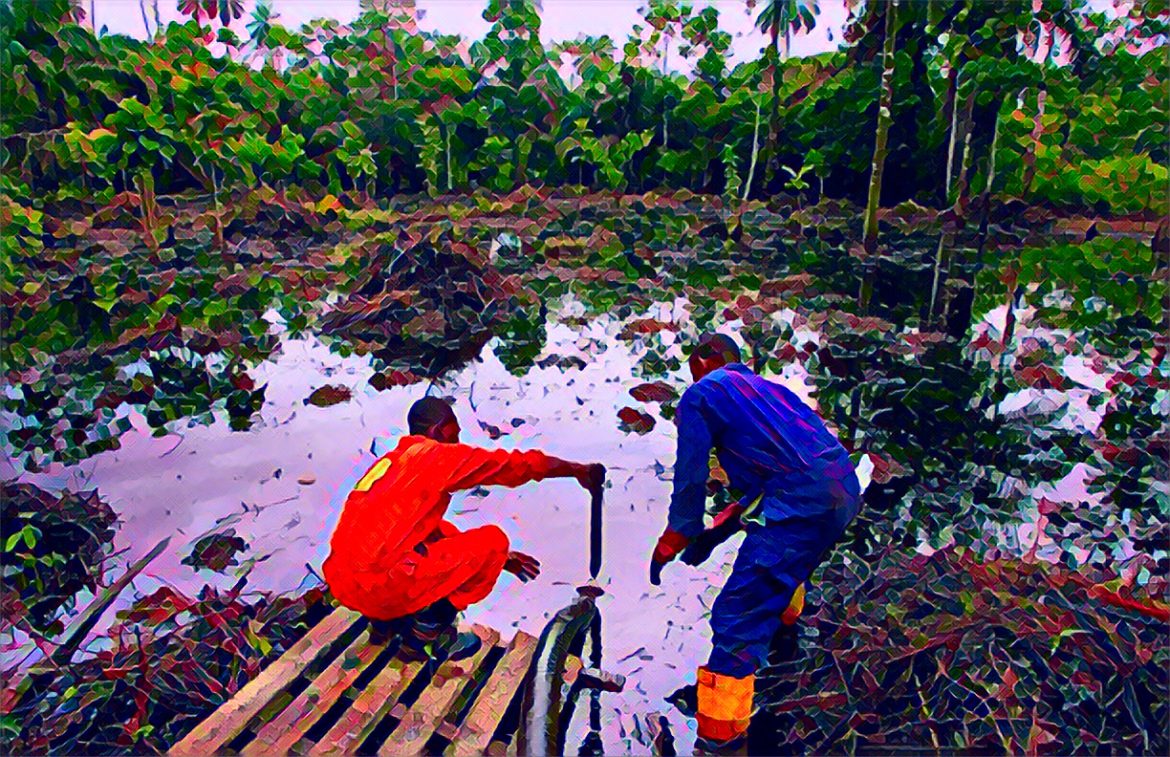KEY POINTS
- Oil spills in the Niger Delta affect ecosystems, health, and livelihoods.
- Contaminated water exposes communities to diseases, skin issues, and respiratory illness.
- Community action, stricter regulations, and corporate accountability are critical solutions.
The Niger Delta, home to one of Africa’s largest oil-producing regions, has long been plagued by the environmental consequences of oil spills.
With vast networks of pipelines crisscrossing communities, oil leaks have become a major threat to ecosystems, public health, and local livelihoods.
Oil spills occur when pipelines rupture, equipment fails, or illegal activities like oil theft and bunkering take place.
While oil companies blame saboteurs for most spills, local communities argue that poor maintenance and outdated infrastructure are to blame. Regardless of the cause, the consequences are severe.
Spilled crude oil contaminates rivers, creeks, and farmlands, turning once-fertile soil into toxic wastelands. Rivers that once provided fish for local fishermen become polluted, leading to dwindling fish stocks and loss of income for fishing communities.
For many, fishing is their primary source of income, and oil spills leave them with few alternatives for survival.
The toxic effects of oil spills extend beyond the environment. Human health is also at risk.
Contaminated water sources expose communities to diseases and infections, while prolonged exposure to oil fumes can cause respiratory issues, skin irritations, and other health complications.
Communities in the Niger Delta have called for oil companies to be held accountable. Lawsuits against major oil firms like Shell and Eni have led to compensation payouts, but critics argue that these payments are insufficient.
While some progress has been made, the region continues to grapple with the devastating effects of oil spills.
The health consequences of oil pollution in Niger Delta communities
Oil spills in the Niger Delta have significant health implications for local communities. Exposure to contaminated water and soil has led to outbreaks of diseases like cholera, skin infections, and respiratory illnesses.
One of the most pressing health concerns is the contamination of drinking water. When oil seeps into rivers, streams, and underground aquifers, it renders them unsafe for human consumption.
Local residents often have no choice but to use this contaminated water for drinking, cooking, and bathing, exposing themselves to toxic chemicals.
Prolonged exposure to oil fumes, particularly from spill sites that have not been cleaned up, can lead to respiratory issues.
Children and the elderly are most vulnerable, as their immune systems are less equipped to handle prolonged exposure to pollutants. Residents living near oil spill sites report coughing, wheezing, and other respiratory problems that are often linked to hydrocarbon exposure.
Skin diseases are another health challenge. When locals come into contact with polluted water, they may develop rashes, skin irritations, and other dermatological conditions. Children playing in affected water bodies are at high risk of exposure.
These health challenges highlight the need for stronger environmental regulations and corporate responsibility.
Oil companies have been criticized for their slow response to spill incidents and their failure to prioritize community health.
Environmental watchdogs and human rights groups have called for better health interventions, medical support, and community sensitization on the dangers of oil pollution.
Community-led efforts and calls for accountability in the Niger Delta
The impact of oil spills in the Niger Delta has prompted local communities, NGOs, and advocacy groups to demand greater accountability from oil companies and the Nigerian government.
Local communities have often been at the forefront of the fight for justice. This involves filing lawsuits and organizing protests to hold oil firms accountable.
One high-profile case involved Shell, which faced lawsuits in both Nigerian and international courts. Communities accused the oil giant of negligence, arguing that its pipelines were poorly maintained, leading to repeated spills.
In 2021, Shell agreed to pay $111 million in compensation to the Ejama-Ebubu community after a 1970 oil spill devastated their land.
While compensation payments have brought some relief, many argue that it is not enough. Community leaders emphasize the need for proper cleanup and restoration of affected areas.
Polluted lands and waterways take years, sometimes decades, to recover. Local activists, along with international NGOs like Amnesty International, continue to pressure oil firms to take greater responsibility for environmental rehabilitation.
The Nigerian government has also pledged to address the environmental damage caused by oil spills. The Hydrocarbon Pollution Remediation Project (HYPREP) was launched to clean up polluted areas in Ogoniland, one of the most affected regions.
However, progress has been slow, and critics argue that cleanup efforts are underfunded and poorly managed.
Addressing oil spills in the Niger Delta requires collective action from the government, oil companies, and communities.
Without stricter enforcement of environmental regulations and faster cleanup responses, the region will continue to suffer from the long-term effects of oil pollution.


